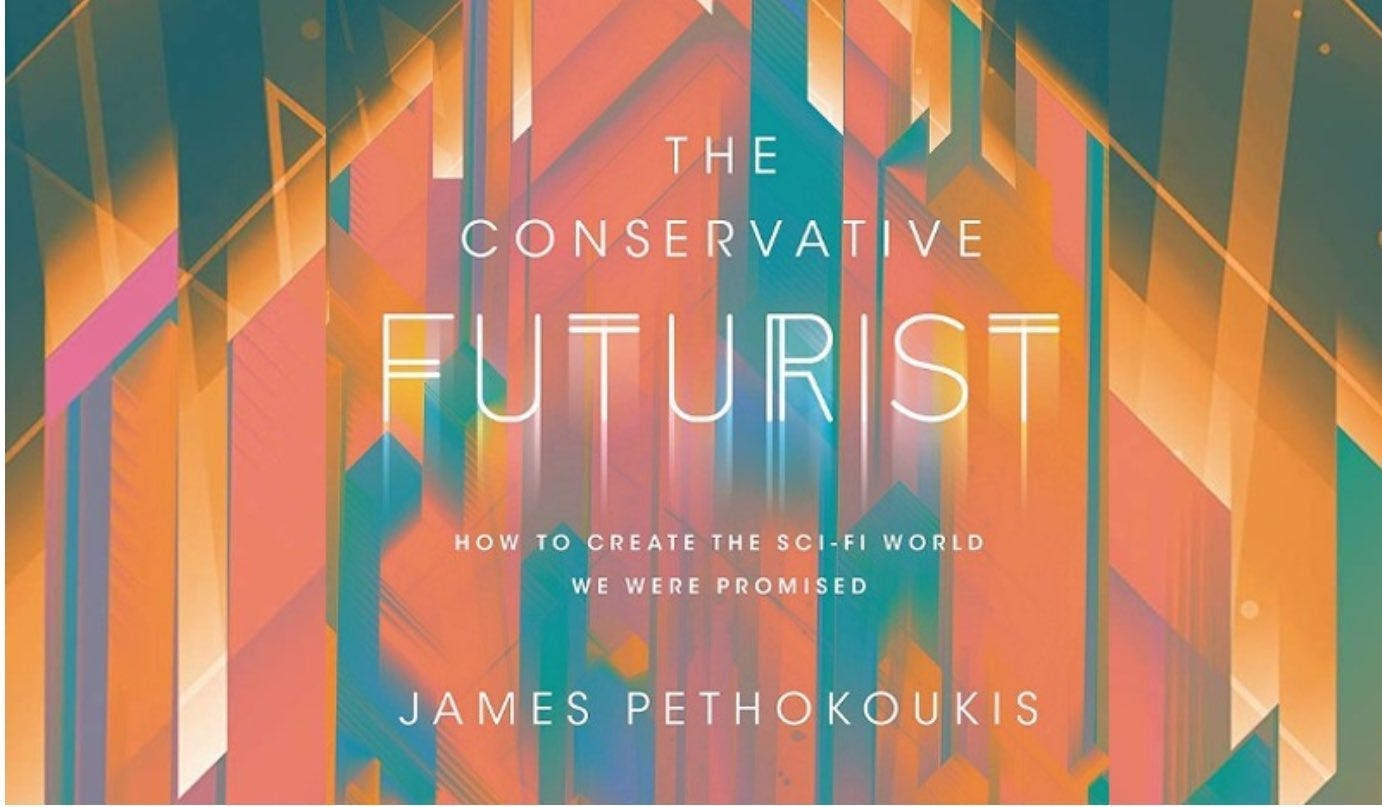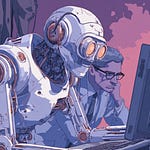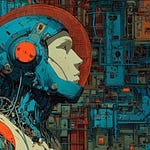My fellow pro-growth/progress/abundance Up Wingers,
The 1990s and the dawn of the internet were a pivotal time for America and the wider world. The history of human progress is a series of such pivotal moments. As Peter Leyden points out, it seems we’re facing another defining era as society wrestles with three new key technologies: artificial intelligence, clean energy, and bioengineering.
Today on Faster, Please! — The Podcast, I chat with Leyden about American leadership in emerging technology and the mindset shifts we must undergo to bring about the future we dream of.
Leyden is a futurist and technology expert. He is a speaker, author, and founder of Reinvent Futures. Thirty years ago, he worked with the founders of WIRED magazine, and now authors his latest book project via Substack: The Great Progression: 2025 to 2050.
In This Episode
Eras of transformation (1:38)
American risk tolerance (11:15)
Facing AI pessimism (15:38)
The bioengineering breakthrough (24:24)
Demographic pressure (28:52)
Below is a lightly edited transcript of our conversation.
Eras of transformation (1:38)
I think we Americans tend to reset the clock in which we get in these dead ends, we get in these old patterns, these old systems, and the things are all falling apart, it's not working. And then there is a kind of a can-do reinvention phase . . .
Pethokoukis: Since World War II, as I see it, we have twice been on the verge of a transformational leap forward, economically and technologically. I would say that was right around 1970 and then right around 2000, and the periods of time after that, I think, certainly relative to the expectations then, was disappointing.
It is my hope, and I know it's your hope as well, that we are at another such moment of transformation. One, do you accept my general premise, and two, why are we going to get it right this time?
If I'm hearing you right, you're kind of making two junctures there. I do believe we're in the beginning of what would be much more thought of as a transformation. I would say the most direct parallel is closer to what happened coming off of World War II. I also think, if you really go back in American history, it's what came off of Civil War and even came off of the Founding Era. I think there's a lot of parallels there I can go into, I've written about in my Substack and it's part of the next book I'm writing, so there's a bigger way that I think about it. I think both those times that you're referring to, it seems to me we were coming off a boom, or what seemed to be an updraft or your “Up Wing” kind of periods that you think of — and then we didn't.
I guess I think of it this way: the ’50s, ’60s, and ’90s were exciting times that made it feel like the best was yet to come — but then that momentum stalled. I’m hopeful we’re entering another such moment now, with so much happening, so much in motion, and I just hope it all comes together.
The way I think about it in a bigger lens, I would just push back a little bit, which is, it's true coming off the ’90s — I was at WIRED magazine in the ’90s. I was watching the early ’90s internet and the Digital Revolution and I sketched out at that time, in my first book but also cover stories in WIRED, trying to rough out what would happen by the year 2020. And it is true that coming off the ’90s there was a Dot Com crash, but temporarily, honestly, that with the Web 2.0 and others, a lot of those trends we were talking about in the ’90s actually just kept picking up.
So depending how big the lens is, I would argue that, coming off the ’90s, the full digital revolution and the full globalization that we were starting to see in the early to mid-’90s in some respects did come to fruition. It didn't play out the way we all wanted it to happen — spreading wealth all through the society and blah, blah, blah, and many of the things that people complain about and react to now — but I would argue that a lot of what we were saying in those ’90s, and had begun in the ’90s with the ’90s boom, continued after a temporary pause, for sure.
The Dot Com boom was just frothy investment. It crashed, but the companies that come out of that crash are literally trillion-dollar companies dominating the global economy now here on the west coast. That was some of the things we could see happening from the mid-’90s. The world did get connected through the internet, and globalization did, from a lens that's beyond America, we took 800 million peasants living on two bucks a day in China and brought them into the global economy. There's all kinds of positive things of what happened in the last 25 years, depending on how big your lens is.
I would say that we've been through a largely successful — clearly some issues, “Oh my gosh, we didn't anticipate social media and that stuff,” but in general, the world that we were actually starting to envision in the ’90s came about, at some level — with some flaws, and some issues, and we could have done better, but I'm saying now I think AI is bigger than the internet. I think the idea that humans are now working side-by-side with intelligent machines and being augmented by intelligent machines is a world historical event that is going to go beyond just connecting everybody on the planet through the internet, which is kind of what the ’90s was, and the early Digital Revolution.
This is a bigger deal, and I do think this transformation has the potential to be way bigger too. If we manage it right — including how we did it positively or negatively in the last 25, 30 years off the ’90s — if we do this right, we could really pull off what I think is a reinvention of America and a much better world going beyond this. That’s not a prediction that we're going to do that, but I think we certainly have the potential there.
While I was preparing for our chat, I recalled a podcast I did with Marc Andreessen where we discussed AI — not just its potential to solve big problems and drive progress, but also about the obstacles, especially regulatory ones. He pointed out that those barriers are why we don’t have things like widespread nuclear power, let alone fusion reactors.
When I asked why he thought we could overcome those barriers this time around, he said we probably won’t — that failure should be the baseline because these obstacles are deeply rooted in a risk-averse American society. Now, why isn't that your baseline?
My baseline is that America — again, I'm taking a bigger lens here, which is we periodically come to these junctures in history in which you could say, from left and right, there's kind of an ossification of the old system. What happens is the old ways of doing things, the old systems, essentially get kind of stuck, and ossified, and just defunct, and long in the tooth, and all different ways you can describe it. But what happens at these junctures — and it happened coming off World War II, it happened after the Civil War, I happened after in the Founding Era too, coming off the colonial world — there is an incredible period of explosion of progress, essentially, and they usually are about 25 years, which is why I'm thinking about the next 25 years.
I think we Americans tend to reset the clock in which we get in these dead ends, we get in these old patterns, these old systems, and the things are all falling apart, it's not working. And then there is a kind of a can-do reinvention phase that, frankly, is beyond Europe now. The great hope of the West is still going to be America here. But I think we're actually entering it and I think this is what's happening, and . . . I've read your book, The Conservative Futurist, I would call myself more of a “Progressive Futurist,” but I would say both left and right in this country have gone too extreme. The right is critiquing “government can't do anything right,” and the left is critiquing “the market, corporations can't do anything right.”
The actual American framework is the Hamiltonian government, coming off Lincoln's government, the FDR government. There is a role for government, a vigorous kind of government presence that can drive change, but there's also a great role for the market too.
There’s this center left and center right that has now got to recalibrate for this next era of America. I think because the old system — and from the right, the old system might be big bureaucratic government that was born out of World War II, the great welfare state bureaucracies, also the Pax Americana. Trump is kind of banging against, dismantling that old thing that's been going for 80 years and, frankly, is kind of run out of steam. It's not really working. But the left is also coming out, carbon energy, and drilling for oil, and industrial pollution, and all that other stuff that was coming off of that scaling of the 20th century economy is also not working for the 21st century. We’ve also got to dismantle those systems. But together, looking forward, you could imagine a complete reinvention around these new technologies. AI is a huge one. Without question, the first among equals it's going to be the game changer around every field, every industry.
Also clean energy technologies, I would argue, are just hitting the point of tipping points of scale that we could imagine a shift in the energy foundation. We could see abundant clean energy, including nuclear. I think there's a new re-appreciation of nuclear coming even from left-of-center, but also potential fusion on the horizon.
I also think bioengineering is something that we haven't really got our heads into, but in terms of the long-term health of the planet, and all kinds of synthetic biology, and all kinds of things that are happening, we are now past the tipping point, and we know how to do this.
I think there's three world historic technologies that America could get reinvented around in the next 25 years. I think the old system, left and right, is now done with this old thing that isn't working, but that opens up the potential for the future. So yes, what Andreessen's talking about is the late stage of the last gummed-up system that wasn't working. For that matter, the same thing from the left is complaining about the inequality, and the old system isn't working now the way it was, circulating wealth through society. But I think there's a way to reinvent that and I actually think we're on the verge of doing it, and that's what I'm trying to do for my project, my book, my Substack stuff.
American risk tolerance (11:15)
I think there is an elite on the right-of-center tech and the left-of-center tech that sees the same commonalities about the potential of the technology, but also the potential for transformation going forward, that would be healthy.
Do you feel that there's enough ferment happening that, institutionally, there will be enough space for these technologies to flourish as you hope? That the first time that there's a problem with an AI model where people die because some system failed, we're not going to be like, “We need to pause AI.” That the next time with one of these restarted nuclear reactors, if there's some minor problem, we're not going to suddenly panic and say, “That's it, nuclear is gone again.” Do you think we have that kind of societal resilience to deal? I think we've had too little of that, but do you think there's enough now, for the reasons you're talking about, that we will continue to push forward?
I think there's absolutely the chance that can happen. Now, like Andreessen said, it's not a prediction like, “Oh, this will be fine, it’s all going to work out.” We could also go the way of Europe, which is we could get over-regulated, over-ossified, go back to the old days, be this nice tourist spot that, whatever, we look at our old buildings and stuff and we figure out a way to earn a living, but it's just getting more and more and more in the past. That's also a possibility, and I suppose if you had to bet, maybe that's the greater possibility, in default.
But I don't think that's going to happen because I do believe more in America. I'm also living in Northern California here. I'm surrounded for the last 30 years, people are just jam packed with new ideas. There's all kinds of shit happening here. It's just an explosive moment right now. We are attracting the best and the brightest from all over the country, all over the world. There is no other place in the world, bar none, around AI than San Francisco right now, and you cannot be here and not just get thrilled at the possibility of what's happening. Now, does that mean that we're going to be able to pull this off through the whole country, through the whole world? I don’t know, there is a lot of ambiguity there and this is why you can't predict the future with certainty.
But I do believe we have the potential here to rebuild fundamentally. I think there is an elite on the right-of-center tech and the left-of-center tech that sees the same commonalities about the potential of the technology, but also the potential for transformation going forward, that would be healthy. For example, I know Andreessen, you talk about Andreessen . . . I was also rooted in the whole Obama thing, there was a ton of tech people in the Obama thing, and now there's a ton of tech people who are kind of tech-right, but it's all kind of washes together. It's because we all see the potential of these technologies just emerging in front of us. The question is . . . how do you get the systems to adapt?
Now, to be fair, California, yes, it's been gummed up with regulations and overthink, but on the other hand, it's opened itself up. It just went through historic shifts in rolling back environmental reviews and trying to drive more housing by refusing to let the NIMBY shut it down. There's a bunch of things that even the left-of-center side is trying to deal with this gummed-up system, and the right-of-center side is doing their version of it in DC right now.
Anyhow, the point is, we see the limits on both left-of-center and right-of-center of what's currently happening and what has happened. The question is, can we get aligned on a relatively common way forward, which is what America did coming off the war for 25 years, which is what happened after the Civil War. There were issues around the Reconstruction, but there was a kind of explosive expansion around American progress in the 25 years there. And we did it off the Revolution too. There are these moments where left-of-center and right-of-center align and we kind of build off of a more American set of values: pluralism, meritocracy, economic growth, freedom, personal freedom, things that we all can agree on, it's just they get gummed up in these old systems and these old ideologies periodically and we’ve just got to blow through them and try something different. I think the period we're in right now.
Facing AI pessimism (15:38)
The world of AI is so foreign to them, it's so bizarre to them, it's so obscure to them, that they're reacting off it just like any sensible human being. You’re scared of a thing you don't get.
I feel like you are very optimistic.
Yes, that is true.
I like to think that I am very optimistic. I think we're both optimistic about what these technologies can do to make this country and this world a richer world, a more sustainable world, a healthier world, create more opportunity. I think we're on the same page. So it's sad to me that I feel like I've been this pessimistic so far throughout our conversation and this next question, unfortunately, will be in that vein.
Okay, fair enough.
I have a very clear memory of the ’90s tech boom, and the excitement, and this is the most excited I've been since then, but I know some people aren't excited, and they're not excited about AI. They think AI means job loss, it means a dehumanization of society where we only interact with screens, and they think all the gains from any added economic growth will only go to the super rich, and they're not excited about it.
My concern is that the obvious upsides will take long enough to manifest that the people who are negative, and the downsides — because there will be downsides with any technology or amazing new tool, no matter how amazing it is — that our society will begin to focus on the downsides, on, “Oh, this company let go of these 50 people in their marketing department,” and that's what will be the focus, and we will end up overregulating it. There will be pressure on companies, just like there's pressure on film companies not to use AI in their special effects or in their advertising, that there will be this anti-AI, anti-technology backlash — like we've seen with trade — because what I think are the obvious upsides will take too long to manifest. That is one of my concerns.
I agree with that. That is a concern. In fact, right now if you look at the polling globally, about a third of Americans are very negative and down on AI, about a third are into AI, and about a third, don't what the hell what to make of it. But if you go to China, and Japan, and a lot of Asian countries, it's like 60 percent, 70 percent positive about AI. You go to Europe and it’s similar to the US, if not worse, meaning there is a pessimism.
To be fair, from a human planet point of view, the West has had a way privileged position in the last 250 years in terms of the wealth creation, in terms of the spoils of globalization, and the whole thing. So you could say — which is not a popular thing to say in America right now — that with globalization in the last 25 years, we actually started to rectify, from a global point of view, a lot of these inequities in ways that, from the long view, is not a bad thing to happen, that everybody in the planet gets lifted up and we can move forward as eight billion people on the planet.
I would say so there is a negativity in the West because they're coming off a kind of an era that they were always relatively privileged. There is this kind of baked-in “things are getting worse” feeling for a lot of people. That's kind of adding to this pessimism, I think. That's a bad thing.
My next book, which is coming out with Harper Collins and we just cracked the contract on that, I got a big advance —
Hey, congratulations.
But the whole idea of this book is kind of trying to create a new grand narrative of what's possible now, in the next 25 years, based on these new technologies and how we could reorganize the economy and society in ways that would work better for everybody. The reason I'm kind of trying to wrap this up, and the early pieces of this are in my Substack series of these essays I'm writing, is because I think what's missing right now is people can't see the new way forward. That's the win-win way forward. They actually are only operating on this opaque thing. The world of AI is so foreign to them, it's so bizarre to them, it's so obscure to them, that they're reacting off it just like any sensible human being. You’re scared of a thing you don't get.
What's interesting about this, and again what's useful, is I went through this exact same thing in the ’90s. It's a little bit different, and I'll tell you the differentiation in a minute, but basically back in the ’90s when I was working at the early stage with the founders of WIRED magazine, it was the early days of WIRED, basically meaning the world didn't know what email was, what the web was, people were saying there's no way people would put their credit cards on the internet, no one's going to buy anything on there, you had to start with square one. What was interesting about it is they didn't understand what's possible. A lot of the work I was doing back then at WIRED, but also with my first book then, went into multiple languages, all kinds of stuff, was trying to explain from the mid-’90s, what the internet and the Digital Revolution tied with globalization might look like in a positive way to the year 2020, which is a 25-year lookout.
That was one of the popularities of the book, and the articles I was doing on that, and the talks I was doing — a decade speaking on this thing — because people just needed to see it: “Oh! This is what it means when you connect up everybody! Oh! I could see myself in my field living in a world where that works. Oh, actually, the trade of with China might work for my company, blah, blah, blah.” People could kind of start to see it in a way that they couldn't in the early to mid-’90s. They were just like, “I don't even know, what's an Amazon? Who cares if they're selling books on it? I don't get it.” But you could rough it out from a technological point of view and do that.
I think it’s the same thing now. I think we need do this now. We have to say, “Hey dudes, you working with AI is going to make you twice as productive. You're going to make twice as much money.” The growth rate of the economy — and you're good with this with your Up Wing stuff. I'm kind of with you on that. It could be like we're all actually making more money, more wealth pulsing through society. Frankly, we're hurting right now in terms of, we don't have enough bodies doing stuff and maybe we need some robots. There's a bunch of ways that you could reframe this in a bigger way that people could say, “Oh, maybe I could do that better,” and in a way that I think I saw the parallels back there.
Now the one difference now, and I'll tell you the one difference between the ’90s, and I mentioned this earlier, in the ’90s, everybody thought these goofy tech companies and stuff were just knucklehead things. They didn't understand what they were. In fact, if anything, the problem was the opposite. You get their attention to say, “Hey, this Amazon thing is a big deal,” or “This thing called Google is going to be a big thing.” You couldn't even get them focused on that. It took until about the 20-teens, 2012, -13, -14 till these companies got big enough.
So now everybody's freaked out about the tech because they're these giant gargantuan things, these trillion-dollar companies with global reach in ways that, in the ’90s, they weren't. So there is a kind of fear-factor baked into tech. The last thing I'll say about that, though, is I know I've learned one thing about tech is over the years, and I still believe it's true today, that the actual cutting-edge of technology is not done in the legacy companies, even these big legacy tech companies, although they'll still be big players, is that the actual innovation is going to happen on the edges through startups and all that other thing, unless I'm completely wrong, which I doubt. That's been the true thing of all these tech phases. I think there's plenty of room for innovation, plenty of room for a lot of people to be tapped into this next wave of innovation, and also wealth creation, and I think there is a way forward that I think is going to be less scary than people right now think. It's like they think that current tech setup is going to be forever and they're just going to get richer, and richer, and richer. Well, if they were in the ’90s, those companies, Facebook didn't exist, Google didn't exist, Amazon didn't exist. Just like we all thought, “Oh, IBM is going to run everything,” it's like, no. These things happen at these junctures, and I think we're in another one of the junctures, so we’ve got to get people over this hump. We’ve got to get them to see, “Hey, there's a win-win way forward that America can be revitalized, and prosperous, and wealth spread.”
The bioengineering breakthrough (24:24)
Just like we had industrial production in the Industrial Revolution that scaled great wealth and created all these products off of that we could have a bio-economy, a biological revolution . . .
I think that's extraordinarily important, giving people an idea of what can be, and it's not all negative. You've talked a little bit about AI, people know that's out there and they know that some people think it's going to be big. Same thing with clean energy.
To me, of your three transformer technologies, the one we I think sometimes hear less about right now is bioengineering. I wonder if you could just give me a little flavor of what excites you about that.
It is on a delay. Clean energy has been going for a while here and is starting to scale on levels that you can see the impact of solar, the impact of electric cars and all kinds stuff, particularly from a global perspective. Same thing with AI, there's a lot of focus on that, but what's interesting about bioengineering is there were some world historic breakthroughs basically in the last 25 years.
One is just cracking the human genome and driving the cost down to, it's like a hundred bucks now to get anybody's genome processed. That's just crazy drop in price from $3 million on the first one 20 years ago to like a hundred bucks now. That kind of dramatic change. Then the CRISPR breakthrough, which is essentially we can know how to cheaply and easily edit these genomes. That's a huge thing. But it's not just about the genomics. It's essentially we are understanding biology to the point where we can now engineer living things.
Just think about that: Human beings, we've been in the Industrial Revolution, everything. We've learned how to engineer inert things, dig up metals, and blah, blah, blah, blah, and engineer a thing. We didn't even know how living things worked, or we didn't even know what DNA was until the 1950s, right? The living things has been this opaque world that we have no idea. We've crossed that threshold. We now understand how to engineer living things, and it's not just the genetic engineering. We can actually create proteins. Oh, we can grow cultured meat instead of waiting for the cow to chew the grass to make the meat, we can actually make it into that and boom, we know how it works.
This breakthrough of engineering living things is only now starting to kind of dawn on everyone . . . when you talk about synthetic biology, it's essentially man-made biology, and that breakthrough is huge. It's going to have a lot of economic implications because, across this century, it depends how long it takes to get past the regulation, and get the fear factor of people, which is higher than even AI, probably, around genetic engineering and cloning and all this stuff. Stem cells, there's all kinds of stuff happening in this world now that we could essentially create a bio-economy. Just like we had industrial production in the Industrial Revolution that scaled great wealth and created all these products off of that we could have a bio-economy, a biological revolution that would allow, instead of creating plastic bottles, you could design biological synthetic bottles that dissolve after two weeks in the ocean from saltwater or exposure to sunlight and things like that. Nature knows how to both create things that work and also biodegrade them back to nothing.
There's a bunch of insights that we now can learn from Mother Nature about the biology of the world around us that we can actually design products and services, things that actually could do it and be much more sustainable in terms of the long-term health of the planet, but also could be better for us and has all kinds of health implications, of course. That's where people normally go is think, “Oh my god, we can live longer” and all kinds of stuff. That's true, but also our built world could actually be redesigned using super-hard woods or all kinds of stuff that you could genetically design differently.
That's a bigger leap. There's people who are religious who can't think of touching God's work, or a lot of eco-environmentalists like, “Oh, we can't mess with Mother Nature.” There's going to be some issues around that, but through the course of the century, it's going to absolutely happen and I think it could happen in the next 25 years, and that one could actually be a huge thing about recreating essentially a different kind of economy around those kinds of insights.
So we’ve got three world-historic technologies: AI, clean energy, and now bioengineering, and if America can't invent the next system, who the hell is going to do that? You don't want China doing it.
Demographic pressure (28:52)
We are going to welcome the robots. We are going to welcome the AI, these advanced societies, to create the kind of wealth, and support the older people, and have these long lives.
No, I do not. I do not. Two things I find myself writing a lot about are falling birth rates globally, and I also find myself writing about the future of the space economy. Which of those topics, demographic change or space, do you find intellectually more interesting?
I think the demographic thing is more interesting. I mean, I grew up in a period where everyone was freaked out about overpopulation. We didn't think the planet would hold enough people. It's only been in the last 10 years that, conventionally, people have kind of started to shift, “Oh my God, we might not have enough people.” Although I must say, in the futurist business, I've been watching this for 30 years and we've been talking about this for a long time, about when it’s going to peak humans and then it's going to go down. Here's why I think that's fantastic: We are going to welcome the robots. We are going to welcome the AI, these advanced societies, to create the kind of wealth, and support the older people, and have these long lives. I mean long lives way beyond 80, it could be 120 years at some level. Our kids might live to that.
The point is, we're going to need artificial intelligence, and robotics, and all these other things, and also we're going to need, frankly, to move the shrinking number of human beings around the planet, i.e. immigration and cross-migration. We're going to need these things to solve these problems. So I think about this: Americans are practical people. At its core, we're practical people. We're not super ideological. Currently, we kind of think we're ideological, but we're basically common-sense, practical people. So these pressures, the demographic pressures, are going to be one of the reasons I think we are going to migrate to this stuff faster than people think, because we're going to realize, “Holy shit, we've got to do this.” When social security starts going broke and the boomers are like 80 and 90 and it is like, okay, let alone the young people thinking, “How the hell am I going to get supported?” we're going to start having to create a different kind of economy where we leverage the productivity of the humans through these advanced technologies, AI and robotics, to actually create the kind of world we want to live in. It could be a better world than the world we’ve got now, than the old 20th-century thing that did a good shot. They lifted the bar from the 19th century to the 20th. Now we’ve got to lift it in the 21st. It's our role, it's what we do. America, [let’s] get our shit together and start doing it. That's the way I would say it.
On sale everywhere The Conservative Futurist: How To Create the Sci-Fi World We Were Promised













